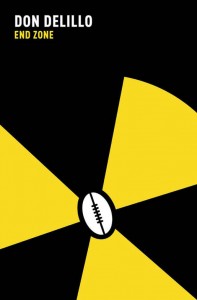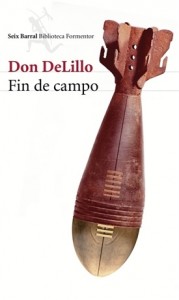 En octubre Seix Barral (otro de los sellos de Planeta, por si alguien no lo sabe) nos trae la última novela que nos faltaba por tener publicada de de Don Delillo, se trata de End Zone que aquí se ha traducido con el equívoco nombre Fin de campo; y digo que el nombre puede llevar a error por el contenido que se puede encontrar el lector:
En octubre Seix Barral (otro de los sellos de Planeta, por si alguien no lo sabe) nos trae la última novela que nos faltaba por tener publicada de de Don Delillo, se trata de End Zone que aquí se ha traducido con el equívoco nombre Fin de campo; y digo que el nombre puede llevar a error por el contenido que se puede encontrar el lector:
“The ball was spotted at our 33. Dennis Smee moved along the line, slapping helmets and pads. Jessup sat next to me on the bench. Blades of grass were stuck to the dry blood on his face. Centrex shifted into a tight-T. Halfback picked up four. Telcon kept for six. Halfback went straight ahead for nine. Halfback went straight ahead for eight. Fullback went off-tackle for four. Fullback went straight ahead, taking George Dole into the end zone with him. The extra point was good.
“Fee-uck,” Jessup said.
“It’s all over.”
Sí, fútbol americano, mucho, un capítulo entero dedicado a un partido con toda la terminología e incluso hay una advertencia del autor antes de empezarlo:
“(The spectator, at this point, is certain to wonder whether he must now endure a football game in print –the author’s way of adding his own neat quarter-notch to the scarred bluesteel of combat writing. The game, after all, is known for its assault-technology motif, and mumerous commentators have been willing to risk death by analogy in their public discussions of the resemblance between football and war. But this sort of thing is of little interest to the exemplary spectator.”
Y no anda desencaminado, en inglés se me hizo cuesta arriba, no tanto por la terminología que acabas cogiendo tras un montón de consultas al diccionario, sino porque es un deporte que no me fascina demasiado, ni lo comprendo ni le encuentro ningún tipo de interés (el béisbol es más entretenido). Me sacaba de la narración cada dos por tres.
 End Zone traducido como “zona de anotación” o “zona final” pegaría más con la terminología asociada a lo que puedes encontrarte en él. La traducción escogida lleva a la parte más metafórica con la amenaza nuclear que se toca también de alguna manera. Pero, sinceramente, si quisiera recomendar a alguien leer a Delillo no le recomendaría este libro por el fuerte peso de lo autóctono y su conexión más que profunda con un deporte que en Europa no es demasiado popular.
End Zone traducido como “zona de anotación” o “zona final” pegaría más con la terminología asociada a lo que puedes encontrarte en él. La traducción escogida lleva a la parte más metafórica con la amenaza nuclear que se toca también de alguna manera. Pero, sinceramente, si quisiera recomendar a alguien leer a Delillo no le recomendaría este libro por el fuerte peso de lo autóctono y su conexión más que profunda con un deporte que en Europa no es demasiado popular.
Lo que no quiere decir que el libro tenga destellos de lo que el autor desarrollará más adelante, bueno, y cosas que perderá, como es el buen humor:
“You‘re saying that what I learn on the gridiron about sacrifice and oneness will be of inestimable value later on in life. In other words if I give up now I’ll almost surely give up the the more important contests of the future.”
“That’s it exactly, Gary”
“I’m giving up.” I said.
Un humor que, en alguna ocasión más irreverente, mezcla con el sempiterno asunto de la culpa en el pueblo judío de una manera bastante ocurrente:
“Why don’t you want to be Jewish anymore?”
“I’m tired of the guilt. That enormous nagging historical guilt.”
“What guilt?”
“The guilt of being innocent victims.”
“That changes the subject.”
“Also the predicate and the object.” He said.
Quizá me pilló un poco a contrapié esta reflexión sobre la cualidad de comodidad que nos dan los clichés a nuestra vida; aunque es cierto que entrarían dentro de esas rutinas que necesitamos para estar estables; lo cual no quiere decir que esté de acuerdo con su proliferación:
“Most lives are guided by clichés. They have a soothing effect on the mind and they express the kind of widely accepted sentiment that, when peeled back, is seen to be a denial of silence. Their menace is hidden with the darker crimes of thought and language. In the face of death, this menace vanishes altogether. Death is the best soil for cliché. The trite saying is never more comforting, more restful, as in times of mourning. Flowers are set about the room; we stand very close to walls, uttering the lush banalities.”
Los dos últimos textos que os traigo vienen a colación sobre uno de los temas más importantes en la carrera de Delillo: la influencia tóxica de la tecnología para todos los ámbitos de nuestra vida. En el primero de ellos la asocia a la eliminación del carácter individual de cada persona y la emparenta directamente con su capacidad de destrucción, para el mundo la mejor tecnología es aquella capaz de traer más obliteración (en la guerra o en otro ámbito parecido por extensión):
“I don´t think we care too much about individual bravery anymore. It´s better to be efficient than brave. So that’s it then. It’s regrettable but there it is. And your technology isn’t any good if it can’t beat the enemy’s. Your weapons have to be more efficient than theirs, more reliable, more accurate, more deadly. Your technology has to reach peak efficiency. It has to stretch itself out, overreach itself; it has to improve itself almost instantaneously. It won’t do this without the stress of war. War brings out the best in technology.”
Y esta identificación violencia-destrucción con la tecnología le sirve, a continuación, para referenciarla a la crisis de un sistema de valores que valora cada vez más esa violencia cuando se la tergiversa, dándole incluso un valor positivo en el colmo de nuestra civilización.
“We all know that life, happiness, fulfilment come surging out of particular forms of destructiveness. The moral system is enriched by violence put to positive use. But as the capacity for violence grows in the world, the regenerative effects of specific violent episodes become less significant. The capacity overwhelms everything. The mere potential of one form of violence eclipses the actuality of other forms. I am interested in these things. I am also interested in the discontinuation of contractions. Medial letters are as valid as any others. I have already begun to revise my speech patterns accordingly.”
Posibles lectores futuros de Fin de campo, evaluad si os puede gustar con este comentario. El que avisa, no es traidor.

Pingback: Lectura y Locura | Resumen Septiembre 2015.Disfrute ante todo